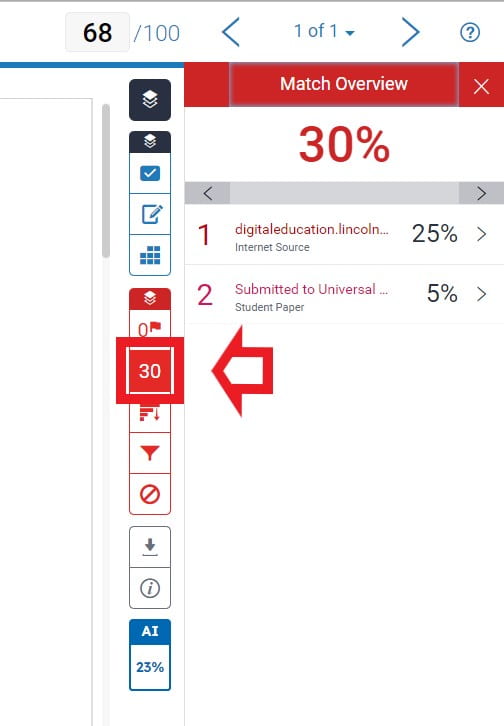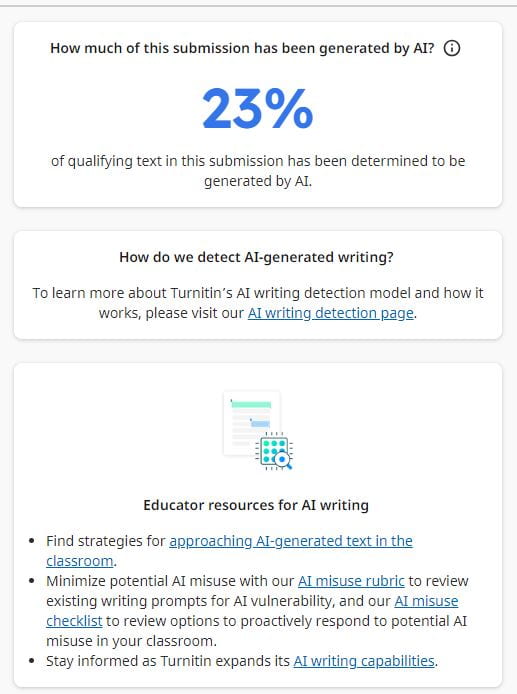Resources Hub
- Home
- Resources Hub
- Turnitin
- Investigating Academic Integrity in Turnitin
Investigating Academic Integrity in Turnitin
This helpsheet will direct academic staff to further guidance relating to the three reports available within Turnitin for supporting academic integrity investigations.
When reviewing student submissions in addition to assessing the extent to which the assessment outcomes have been met, there are a number of questions that may arise related to academic integrity.
Turnitin is a widely used assessment tool at the university of Lincoln which in addition to providing a range of marking and feedback tools, also aids in detecting the following:
- Instances of plagiarism, collusion, or improper citation
- Use of a third-party or ‘contract cheating’ service
- Use of AI-generated content such as that from ChatGPT
In using Turnitin, academic staff have three reports that they can make use of in their academic integrity investigations: Originality Report, AI Report, and Authorship Report.
You will find a brief explanation and link to further guidance for each report below.
Important: The decision to act upon a suspicion of academic misconduct, such as plagiarism or contract cheating, remains an academic decision and responsibility. Whilst Turnitin can assist in investigations, the use of the Turnitin’s reporting features should only be used as part of your evidence gathering.
You should review the reports generated by Turnitin and make informed decisions regarding the academic integrity of any submitted work. A report should not be viewed as proof or an outcome, but rather as a support tool in the decision-making process.
Originality Report
When a paper is submitted to Turnitin, it generates an Originality Report that highlights any matching text found in its database of academic content, including journals, books, websites, and previously submitted papers. Educators can then review the report to determine if there are any instances of plagiarism or inappropriate use of sources.
As noted, it is important to reiterate that Turnitin itself does not determine whether plagiarism has occurred; it simply provides a tool for instructors to identify potential issues that require further investigation.
You can access the Originality Report from within each student’s submission.
For further information see the following guidance: Turnitin: Interpreting Originality Reports from Turnitin – Digital Education Support (lincoln.ac.uk)

AI Detection Report
In response to the recent emergence of AI tools (such as ChatGPT) capable of generating convincing human-written text, Turnitin have now released a new AI detection tool within the Feedback Studio. Like other Turnitin features, this new tool should only be used as an indicator and contributing evidence as part of a wider investigation and not seen as proof of use alone.
If you find that a student on your module has flagged as potentially having used AI to write all or part of their assignment, we strongly recommend that you use this new service as a part of your evidence gathering and use as additional supporting information only. You should continue to use your own experience and knowledge, such as accurate referencing or familiarity with a student’s ability, writing style or a lack of critical analysis, as indicators to inform whether to undertake further investigation.
You can access the AI Report from within each student’s submission.
An indicator is displayed at the bottom of the right-hand side panel (as shown above) which suggests the amount of text within the submission which may have been generated with the use of AI. You can click on this indicator to open the AI writing report, in a new window.
For further information on the AI Report please see the following guidance: Artificial Intelligence (AI) Detection in Turnitin – Digital Education Support (lincoln.ac.uk)

Authorship Report
The Authorship Report within Turnitin is a tool that can be used to compare a written essay with all previous submissions from the same student, across all their modules, and is designed to assist educators identify episodes of ‘Contract Cheating’.
The Authorship Report analyses the writing style and document metadata to support in investigating whether the essay was written by the same person. The Authorship Reporting tool is not currently available to all staff, but rather access has been provided to selected individuals within each School and College.
If you believe that your academic investigation would benefit from the Turnitin Authorship Report, then in the first instance, please speak to your School Director of Teaching and Learning and your College Director of Academic Quality. Or, if a specific process has been established in your School, then follow the guidance as defined.
Note: Digital Education have training guidance that can be shared with those producing reports, however we are not able to support you in interpreting the results.
For further information on what the Turnitin Authorship tool is designed for please see the following guidance: Getting Started with Authorship for Investigators (turnitin.com)
Please find below a flow chart detailing how to approach using the Turnitin Authorship Report.
Click here to access the Authorship Checklist Criteria (Web Link, PDF Opens in a New Tab)